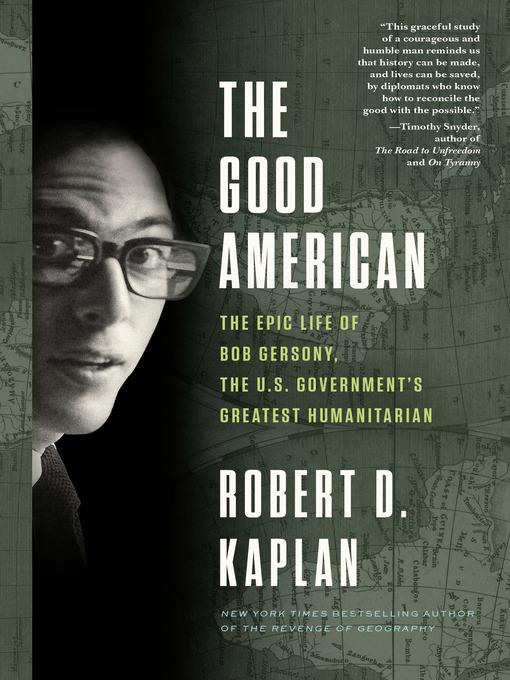
The Good American
The Epic Life of Bob Gersony, the U.S. Government's Greatest Humanitarian
کتاب های مرتبط
- اطلاعات
- نقد و بررسی
- دیدگاه کاربران
نقد و بررسی

August 10, 2020
An “obsessive-compulsive” freelancer with a knack for talking to people epitomizes what foreign policy should be, according to this poignant and provocative biography of Bob Gersony, a retired independent contractor for the U.S. Agency for International Development and the State Department. Journalist Kaplan (The Return of Marco Polo’s World) recounts Gersony’s unsung, four-decade career from the 1970s to the 2010s as he parachuted into humanitarian disasters, refugee crises, and civil wars in order to assess the situation up-close and recommend policies through the straightforward mechanism of interviewing ordinary people. Kaplan credits Gersony with crucial policy redirections, including the Reagan administration’s decision not to arm Mozambique’s RENAMO rebels after he exposed their atrocities in 1988, and recommendations of many aid programs—road-paving in El Salvador, water projects in the West Bank—that allowed people to work instead of fight. It’s a vivid story as Gersony, suffering perpetual nervousness and indigestion, navigates hair-raising conflict zones, and fences with denialist bureaucrats and politicians. It’s also Kaplan’s love-letter to Reagan-era Cold War diplomacy, when “realism... encompassed a concern for human rights.” Liberals may dispute that assessment, but Kaplan’s immersive, ground-level view of practical foreign policy-making gives it substance. This incisive account pays tribute to the people who uphold America’s ideals to the world. Agent: Gail Hochman, Brandt & Hochman.

August 15, 2020
For four decades, a daring American assessed trouble spots throughout the world. Robert Gersony (b. 1945), the son of Central and Eastern European refugees, spent a productive, interesting career as a special consultant for the State Department, the U.S. Agency for International Development, and the United Nations, conducting firsthand research on "virtually every war and disaster zone on earth." Veteran journalist and author Kaplan, who met Gersony in Khartoum in 1985, draws on hundreds of hours of interviews with him, along with abundant additional sources, to create a vividly detailed chronicle of the courageous, challenging life of "the ultimate field worker." Convinced that "evidence...rather than theories" must inform foreign policy, Gersony conducted long, intense interviews with more than 8,000 refugees, displaced persons, and humanitarian workers, exposing the reality of their experiences. "The most sensitive things they told me on their own," Gersony said. Kaplan recounts Gersony's work in South America, Africa, Asia, and the Middle East, from Guatemala in the 1970s to North Korea in 2002. Gersony was passionate about human rights, working long hours in dangerous, sometimes life-threatening conditions, and defiant against policy wonks. Much of American aid, he believed, "is a complete waste of money, since it is not integrated with a plan for governance or business development." After the Berlin Wall came down and the Soviet Union collapsed, a new optimism arose about the state of the world, which Gersony did not share: "It was another example of Washington elites manufacturing a theory: a theory born with dramatic events in Central Europe that they mistakenly applied to the whole world." His witnessing of "state failure, rule-of-law breakdowns, genocide, and long-standing ethno-nationalist conflict" sharply contrasted that worldview, but knowledge about the world, Kaplan learned, is gleaned now from consulting groups rather than the kind of research to which Gersony devoted his career. A life story that reads like an action thriller.
COPYRIGHT(2020) Kirkus Reviews, ALL RIGHTS RESERVED.

September 1, 2020
Kaplan (The Return of Marco Polo's World, 2018), a best-selling global affairs writer, presents a biography of humanitarian-crisis investigator Robert Gersony that celebrates a life of selfless dedication in perilous circumstances and offers an elegy for a time when humanitarian aid figured more prominently in U.S. foreign policy. A skilled interviewer, Gersony believed that the best way to learn about a conflict zone was to go there and speak with ordinary people. Vietnam taught him to value the facts on the ground, and aid work in Latin America taught him how to deal with the powerful in service of the powerless. Working constantly, mostly as a freelancer, Gersony wrote dispassionately, including a report on the Rwandan genocide, compartmentalizing powerful feelings about his subjects. Despite a life spent in Guatemala, Uganda, Sudan, Somalia, and North Korea, to name a few, he disliked travel and kissed the floor every time he came home. Kaplan writes with earnest reverence for a longtime friend and wistful praise for the particular blend of realism and idealism that Gersony represented, which seems less valued in today's world.(Reprinted with permission of Booklist, copyright 2020, American Library Association.)

Starred review from November 1, 2020
Award-winning journalist Kaplan (The Return of Marco Polo's World) shows the positive effects humanitarian work can have in this insightful biography. During his four-decade career, Robert Gersony (b. 1945) worked as a freelance contractor for the U.S. Agency for International Development (USAID). As a fieldworker, the author journeyed into crisis areas in Central and Latin America, Africa, and Asia. It was on these assignments that he perfected his trademark methodology of talking and listening to people, which allowed him to foster a sense of empathy and develop a clearer picture of individual needs. Working tirelessly, Gersony's meticulously written reports influenced American foreign policy and allowed well-placed aid to have a more immediate and longer-lasting impact. Kaplan views the world of humanitarian and foreign policy work of the 1970s and 1980s as a less overtly ideological period where people like Gersony and career diplomats worked hand-in-hand. Based on hundreds of hours of interviews with Gersony, his colleagues, as well as personal recollections, Kaplan deservedly shines the light on a humanitarian who spent much of his career working anonymously. VERDICT A must read for anyone interested in humanitarian work, foreign policy, and biography.--Chad E. Statler, Westlake Porter P.L., Westlake, OH
Copyright 2020 Library Journal, LLC Used with permission.

























دیدگاه کاربران